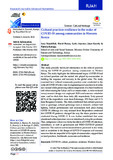Cultural practices resilience in the wake of COVID-19 among communities in Western Kenya
Date
2022-10-19Author
Lucy, Mandillah
David, Barasa
Lydia, Anyonje
Janet, Kassily
Patricia, Kariaga
Metadata
Show full item recordAbstract
This study provides first-hand information on the cultural practices during the COVID-19 pandemic among communities in Western Kenya. The study highlights the differentiated impact COVID-19 had on cultural practices and the central role played by communities in building the response and recovery to the global crisis. The study examined how cultural community practices were conducted in the wake of COVID-19 with a view to engineering such practices to fit in the new normal while preserving salient components of cultural traditions and values among the Luhya and Luo communities. A cross-sectional survey research design was employed. FGDs and interview schedules were used to elicit data from forty (40) respondents. Sixty percent (60%) of the respondents were from Kakamega, 25% Siaya and 15 % from Bungoma Counties. The study established that cultural practices such as greetings; cultural gatherings such as funerals; cultural bull fighting, Isukuti performances and circumcision took place during COVID-19, although at a very minimal level. Respondents confessed that COVID-19 protocols changed the way the above practices were conducted during COVID-19. It was further established that some abandoned cultural practices were re-introduced during the pandemic. Thus, indigenous culture was hit by the effects of COVID-19 infections, surveillance, as well as government and WHO COVID-19 protocol measures. The analysis and recommendations presented in this study seek to contribute to the design of COVID-19 response and recovery measures that are respectful of the rights of communities, support their cultural practices, livelihoods, economies and resilience.
URI
https://royalliteglobal.com/advanced-humanities/article/view/902http://ir-library.mmust.ac.ke:8080/xmlui/handle/123456789/2115
Collections
- Journal Articles [411]

